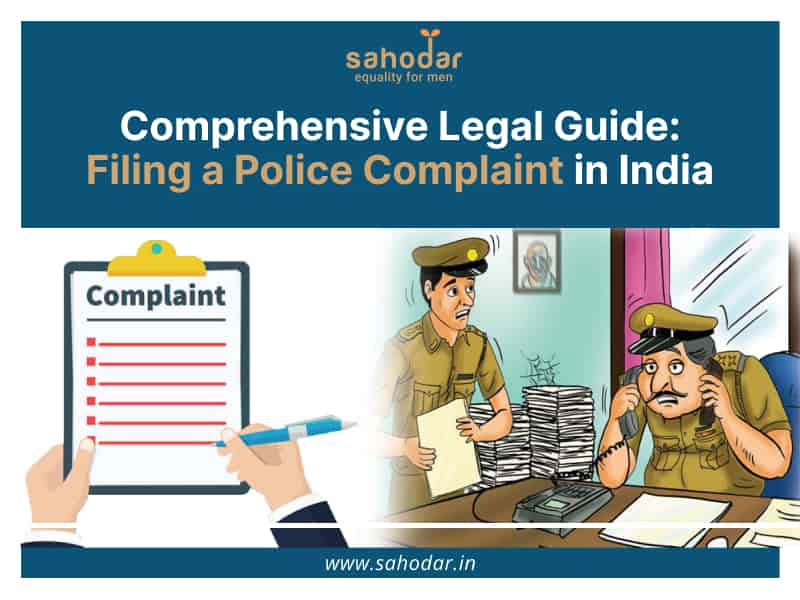In the complex tapestry of India’s legal system, the process of filing a police complaint stands as a pivotal point where citizens engage with the machinery of justice. This comprehensive guide delves deep into the legal intricacies governing the initiation of complaints, elucidating the statutory provisions, procedural guidelines, and inherent rights enshrined within the Indian legal framework.
Foundational Understanding of Legal Categories
The Indian legal system categorizes complaints into two primary domains: criminal offenses and non-cognizable matters. Criminal offenses, delineated under the Code of Criminal Procedure (CrPC), mandate the filing of a First Information Report (FIR), as per Section 154. Conversely, non-cognizable offenses necessitate the submission of a complaint before a magistrate or police officer, as outlined in Section 155(2) of the CrPC.
Territorial jurisdiction plays a pivotal role in determining the appropriate venue for filing complaints. Section 156 mandates that complaints must be lodged at the police station having territorial jurisdiction over the place where the offense occurred, underscoring the importance of geographical proximity in legal proceedings.
Information Gathering and Documentation
Central to the complaint-filing process is the comprehensive gathering of information pertaining to the incident. Crucial details such as the date, time, location, and parties involved serve as foundational pillars upon which the complaint rests. Evidentiary support, encompassing witness statements, photographs, medical reports, and corroborative documentation, buttresses the veracity of the complaint, lending credence to the allegations articulated therein.
Initiating Contact with Law Enforcement
The commencement of the complaint process entails a direct interface with law enforcement authorities. Complainants are advised to approach the designated duty officer or Station House Officer (SHO) at the pertinent police station, fostering a transparent exchange of information conducive to the accurate recording of the complaint.
Articulating the allegations with precision and clarity is imperative, ensuring that pertinent factual details are communicated effectively to facilitate the accurate transcription of the complaint into a legally recognized document.
Formalizing the Complaint
At the heart of the complaint lies the First Information Report (FIR), a sacrosanct legal document recording the crux of the allegations. Section 154 of the CrPC mandates the expeditious recording of FIRs upon receipt of information regarding cognizable offenses. Compliance with the statutory stipulations governing the contents of FIRs, as delineated in Section 154(2) of the CrPC, is imperative to ensure the legal sanctity of the document.
Procedural Oversight and Monitoring
Post-complaint lodgment, diligent oversight of the investigative process is indispensable. Regular engagement with law enforcement authorities facilitates the monitoring of investigatory progress, enabling the timely provision of additional information or assistance necessitated by evolving circumstances.
The statutory imperative enshrined in Section 157 of the CrPC mandates the expeditious initiation of investigations upon the registration of an FIR, underscoring the urgency with which law enforcement agencies are expected to respond to complaints.
Legal Recourse and Advocacy
In navigating the labyrinthine corridors of the legal system, seeking legal counsel from proficient practitioners adept in matters of criminal law is advisable. Qualified advocates equipped with the requisite legal acumen can provide invaluable guidance, navigating the complexities inherent in legal proceedings and safeguarding the interests of the complainant.
Additionally, collaboration with advocacy groups specializing in legal aid and rights advocacy can furnish supplemental support, augmenting the efficacy of the complaint-filing process and fortifying the complainant’s position within the legal landscape.
Adherence to Legal Rights and Obligations
Integral to the complaint-filing process is the assertion of inherent legal rights and the fulfillment of concomitant obligations. Article 21 of the Constitution of India confers upon every individual the inviolable right to lodge complaints devoid of coercion or intimidation, underscoring the foundational principles of justice and equity.
Simultaneously, law enforcement agencies are entrusted with the solemn duty of registering complaints impartially and initiating requisite investigations, thereby upholding the sacrosanct tenets of the rule of law.
Documentation and Record-Keeping
Meticulous documentation of all communication and correspondence is indispensable, serving as a bulwark against procedural irregularities and evidentiary lacunae. Preservation of records, including copies of the FIR, correspondence with law enforcement authorities, and any ancillary documentation, ensures the availability of contemporaneous evidence crucial for substantiating the complaint in legal proceedings.
The evidentiary significance of meticulously maintained documentation cannot be overstated, underscoring its indispensable role in buttressing the veracity of the complaint and fostering transparency within the legal process.
Pursuit of Remedial Measures
In the event of unsatisfactory investigatory outcomes, recourse to remedial measures becomes imperative. Complainants may explore legal avenues for redressal, including the filing of appeals or seeking judicial intervention through appellate or judicial forums.
Persistence and vigilance in pursuing remedial measures are paramount, reflecting the indomitable spirit of justice and the unwavering commitment to securing equitable resolution within the ambit of the law.
Conclusion:
Navigating the legal terrain of filing a police complaint in India necessitates a nuanced understanding of statutory provisions, procedural guidelines, and inherent rights. By adhering to prescribed protocols, exercising legal rights judiciously, and seeking informed recourse, individuals can navigate the legal landscape adeptly, thereby fostering accountability, transparency, and equity within the domain of justice.

